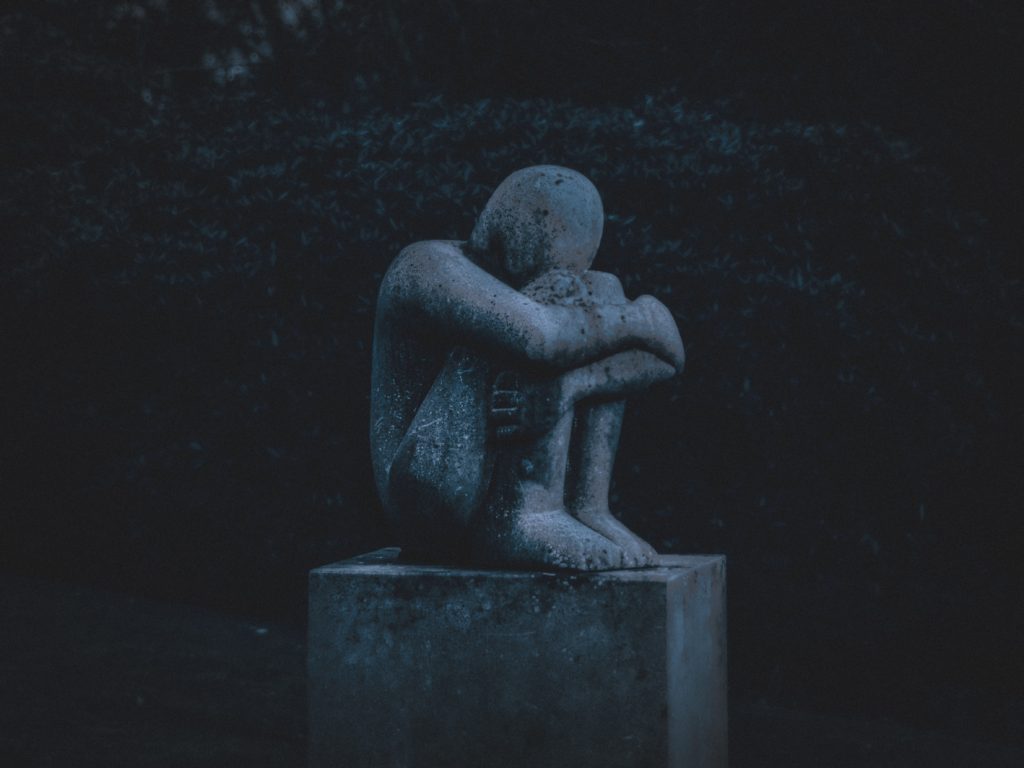by Marie Bruce

In my time as a Cruse Bereavement Care counsellor, I have seen many different types of grief and a myriad of ways in which people either deal with it or avoid it, but perhaps one of the saddest forms of grief is exaggerated grief. This basically means that the bereaved party finds it impossible to move on from the death.
Of course it will always take some people longer than others to come to terms with a death; the very young and the elderly find grief particularly hard to bear. While there is no timetable on the grieving process, some people lose the prime of their lives in a deep, prolonged grief that overshadows everything else. This can lead to depression, addiction and other mental health issues.
Although the correct clinical term ‘exaggerated grief’ brings to mind some kind of theatrical pretence, the truth is that this grief is genuine and runs very deep in the personal psyche of the individual, making 'exaggerated' somewhat misleading. For this reason, I personally refer to it as 'prolonged grief' or 'complex grief', especially when discussing it with a client.
The symptoms of this type of prolonged grief include a tendency to be self-absorbed and lost in preoccupied thoughts of the departed, with a need to bring all conversations back to the subject of the person who died. Re-enactments are also common, where the bereaved person repeats aspects of their past life with the departed. This can range from going on the same holidays to eating their favourite foods. Other symptoms are a refusal to sort through the belongings of the departed and a tendency to make shrines out of these things, along with photos of the dead person all around the house. In moderation, these behaviours are perfectly natural, but collectively and in excess they are a sign that someone is heading into the territory of exaggerated grief.
But why is this a problem: surely people should be able to grieve any way they see fit? It is a problem because it isn’t a healthy way to grieve, and because it sets up more problems further down the line. This kind of unhealthy grieving leads to mental health issues, low immunity, family squabbles and the loneliness that comes with isolation. The bereaved person might not want to socialise at all, preferring to stay at home with their shrines, because going out alone is too much for them. In the long term, this type of grieving blocks the healing process from taking place.
At its root, exaggerated grief develops because the client is reluctant to accept the death of a loved one. This could be because they lost their individuality within that relationship, identifying themselves so closely with the person who died that they can’t seem to function without them. Their personal psyche is so tied up with the deceased that they may have lost all sense of personal identity. Fear of the future becomes so pronounced that the client will do anything to try to keep things the same, as much as possible, because the unwanted change the death has created is perceived as a huge threat. This is when anger, anxiety and isolation issues kick in.
People who have a personality disorder are also more prone to this type of complex grieving. The personality disorder need not be severe to have this effect: we all know people who seem to thrive in chaos and live for drama, and such individuals are more at risk of developing exaggerated grief. Also, this type of client might develop a certain fascination with death and funerals, attending as many as they can, all while bemoaning their own loss to the newly bereaved! Birds of a feather flock together and this client identifies more with death than with life, marking every death-day on their calendar in the way most people mark down birthdays and celebrations.
Make no mistake, exaggerated grief can continue for decades and can be absorbed into the personality traits of an individual unless an intervention is made, usually in the form of counselling. So, why would anyone choose to live like this and what can we do to help them? Firstly, it is important to understand that for most people this type of grief is not a choice, it develops at an unconscious level. Secondly, there are certain pay-offs that they soon learn to adapt to – in Transactional Analysis Counselling we would refer to these pay-offs as stamps. Someone deep into exaggerated grief is subconsciously collecting stamps and learning to accept the pay-offs as a fair trade for their initial loss, the biggest pay-off being that they get lots of attention!
Family and friends will frequently pay more attention to someone who has been bereaved than they did before, so the best way to keep hold of that attention is to maintain the grief. Adult children, siblings and spouses might take on more responsibilities for the bereaved as well, and while this is a well-meaning act, if it continues for too long the client could develop learned helplessness, where they feel incapable of shifting for themselves. Again, the best way to keep this pay-off is to keep acting helpless and feeling hopeless.
Perhaps the biggest pay-off is that with all this extra help and attention, the client doesn’t have to move on in their life or take responsibility for themselves – which for someone who is fearful of the future and wants to keep things the same as much as possible, is quite a tempting offer. But there are drawbacks too: eventually family and friends lose patience and they might start to avoid their grieving relative, thus leading to an increased sense of isolation. Living in the past creates depression, while fear of the future and an obsession with death creates anxiety. Usually at this point, someone, possibly a GP, will suggest counselling as an option – and not before time, you might say!
And so the client sits nervously in the therapy room, distressed about the death of yesteryear and upset about the family squabbles that have suddenly blown up, looking to their counsellor for help. As a counsellor, this is the mess that has to be sifted through; a mess that has probably taken years, sometimes decades to create and you have half a dozen sessions to ‘make it all better’. No pressure then. How do you even begin to unravel all of this?
The answer is ‘Very, very gently’. Bear in mind that the client might still be reluctant to change; they could be holding on to anger and resentment that a qualified counsellor will need to draw out; they may have developed secondary issues that need to be addressed before they can even begin to look into their initial loss and the grief spiral it triggered. As the counsellor carefully sifts through what is essentially a huge can of worms, the client may become hyper sensitive or difficult.
What can you do if you know someone who is experiencing exaggerated grief? Try to have patience and be more aware of the backstory outlined in this post; challenge gently and set small tasks to nurture their sense of capability. Suggest grief counselling and praise them for seeking out help, but make no promises – no-one can bring their Lazarus back to life, but professional counselling can help them to begin living their life once more. Because that is the very essence of grief counselling; it isn’t about the dead – it is about helping those left behind to start living again. Until next month,
Serene Blessings
Marie Bruce x
 Find out more:
Find out more:
Marie Bruce Dip. T.C. MBACP is a qualified psychotherapist, Cruse Bereavement Counsellor and best-selling self-help author. She specialises in grief and loss counselling, PTSD and military counselling, and life coaching.
In this monthly column, Marie offers simple tools used by therapists to help clients and readers improve their mental well-being.
Marie’s books are available on Amazon UK.
More from this author:
Creative Counselling: The Psychology of Shopping Addiction
Creative Counselling: Ghosts of Christmas Past
Creative Counselling: "Who Does She Think She Is?!"


 Find out more:
Find out more:















